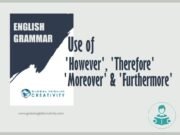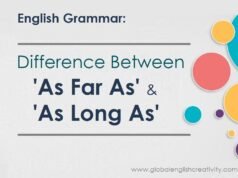Understanding “Even Though,” “Even If,” and “Even So”
In English grammar, conjunctions and transitional phrases play a crucial role in conveying contrast, concession, and unexpected outcomes. Among these, “even though,” “even if,” and “even so” are particularly important. Though they are often confused or used interchangeably, each serves a distinct purpose in sentence construction. Let’s explore the nuances of these expressions.
‘Even Though’: Expressing Contradictory Facts
“Even though” is used to introduce a fact or situation that contrasts with another fact. It emphasizes a surprising or unexpected outcome despite the initial fact. This conjunction is always followed by a clause, which is a group of words containing a subject and a verb.
Examples:
“Even though it was raining, we decided to go for a hike.”
“She continued to work, even though she was feeling unwell.”
In these sentences, “even though” highlights the contrast between the expected behavior (staying indoors or resting) and the actual outcome (going for a hike or continuing to work).
‘Even If’: Discussing Hypothetical Situations
“Even if” is used to introduce a hypothetical situation or condition. It implies that the result or action would be the same regardless of whether the condition is true. This phrase is often used to emphasize a strong determination or inevitability.
Examples:
“I will attend the conference even if it rains.”
“He plans to pursue his dream, even if he faces challenges.”
Here, “even if” sets up a scenario that may or may not happen (rain, facing challenges) but asserts that the main action (attending the conference, pursuing a dream) will occur regardless.
‘Even So’: Introducing a Concessive Conclusion
“Even so” is a transitional phrase used to introduce a conclusion or statement that contrasts with what has just been mentioned. It serves as a way to acknowledge the initial statement but then present a differing or unexpected conclusion.
Examples:
“She studied hard for the exam. Even so, she found it difficult.”
“The weather was terrible. Even so, the event was a success.”
In these examples, “even so” acknowledges the preceding clause (studying hard, terrible weather) and then presents a contrasting outcome (finding the exam difficult, the event being a success).
Distinguishing the Differences
While all three phrases deal with contrast and unexpected outcomes, they serve different grammatical and contextual roles:
“Even though” focuses on the contrast between factual situations.
“Even if” deals with hypothetical or uncertain conditions.
“Even so” introduces a contrasting conclusion despite acknowledging a preceding fact.
Understanding the correct usage of these expressions can greatly enhance clarity and precision in both written and spoken English. They are valuable tools for expressing nuanced ideas and ensuring that your message is accurately conveyed.
Examples
- Even though it was raining, we went for a hike.
- She decided to attend the meeting even though she was not feeling well.
- Even though he studied hard, he did not pass the exam.
- They finished the project on time even though there were many delays.
- Even though I was tired, I stayed up late to finish the book.
- Even though the team played well, they lost the match.
- He went to work even though he had a high fever.
- Even though she knew the answer, she didn’t speak up in class.
- They kept working even though the conditions were harsh.
- Even though the weather was bad, they enjoyed their vacation.
- I will go to the concert even if it rains.
- Even if you apologize, it may not solve the problem.
- Even if he is late, we will wait for him.
- She plans to travel even if she doesn’t get a promotion.
- Even if you don’t agree, you should listen to their point of view.
- He will try out for the team even if he doesn’t make it.
- Even if they offer me a raise, I might not accept the job.
- I will finish the project even if it takes all night.
- Even if I fail, I will have learned something valuable.
- Even if the meeting runs late, I have other plans afterward.
- She was tired; even so, she finished her work on time.
- The weather was bad; even so, they decided to go hiking.
- He made several mistakes; even so, he completed the task.
- The movie had bad reviews; even so, I enjoyed it.
- Even so, they were determined to succeed despite the challenges.
- The store was crowded; even so, we found everything we needed.
- She apologized; even so, he was still upset.
- Even so, they managed to finish the project ahead of schedule.
- He was warned about the risks; even so, he went ahead with the plan.
- Even so, they decided to continue their journey despite the difficulties.
also see:
| ONLINE GRAMMAR QUIZZES |
| ENGLISH GRAMMAR_1 |
| ENGLISH GRAMMAR_2 |
| GRAMMAR: SPOT THE ERROR |
| USEFUL EXPRESSIONS IN ENGLISH SPEAKING |
| WORD FORMATION PROCESSES |
| PHONETICS |







































